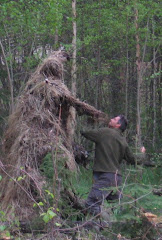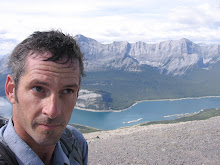Well, next week I depart for the woods for a few months to audit clearcuts, a mostly peaceful and solitary endeavor, broken only by the daily hurricane of helicopter insertions and the odd bear encounter. I recently read Greenpeace's latest media release about the boreal forest. Its been my job to audit the transformation from clearcut back to forest so when their claims don't match my experience or data, it naturally leaves me jaded. Either they lie because they think its worth it or they're just not very smart and make lots of mistakes, I'm not sure. But when I see that their report has the sigs of some forestry profs from Toronto, I realize just how easily objective science gets hijacked and slaughtered in the name of ideology.
I do look forward to getting away from my civ. I can only endure so much of my fellow species before I really go off my tree. A welcome break from people wailing about climate change who don't understand basic chemistry. A break from robotic eco parrots whistling about carbon dioxide, ignorant that ice core data shows no correlate between carbon dioxide and rising temperatures. Appeals to truth by means of status: "look at all these scientists who believe this" the surest sign that an argument cannot be won on its merits. Yes, I'm really tired of listening to myself complain about how an essentially scientific question is argued by halfwits with and without Phds. Opinion is the raw material of politics, not science. Science is about testing, results, analysis and verification/falsification. So far in the debate over whether man is responsible for the recent warming, I see only the former and none of the later.
And so on Earth Day rather than make myself feel good by imagining that I'm saving the planet (by the way, the planet will be just fine what ever we do or don't do) I chose to do something of substantial effect. I donated money to handicapped kids (a cause with resonance to me as a healed cripple) and purchased some malaria prevention nets (another malady I am too familiar with) to be distributed in Africa. Small tokens it's true but I felt confident that this marginal effort was more than lip service to a cause which I fear the environmental movement suffers from in spades. When people aren't suffering and dying needlessly, I suppose I will contemplate hypothetical impeding disasters such as the environment.

Subscribe to:
Post Comments (Atom)


13 comments:
Well spoken, and well done.
*mental note* don't post on an empty stomach and not enough sleep...
Did you actually read the Greenpeace paper?
pdf here
The objection you voiced (to me) is addressed fairly clearly on page 13 and appears well researched, citing 8 other papers.
I did read the paper and the amount of carbon loss is temporary. Its true that when you cut down some forest- there is no forest there! But you would have to drown it in pesticide for it not to grow back. If you want to take a point in time and say there's less carbon there- go ahead- its just meaningless in the context of the long term forest cycle.
The fact that Co2 levels are poorly related to warming makes this all moot anyway.
In any case forest fires are the biggest carbon release in the forest. Some years fires burn nearly 8 times as much as is logged. That carbon goes directly into the atmosphere as opposed to being locked up in wood products. If you've never walked through a burn I can assure you that the increased surface temperature rivals that of a clearcut for the first year. After 3 or 4 years they're pretty indistinguishable.
compared to fires, the temporary carbon loss in the first year of a clearcut is pretty insignificant.
As far as my personal politics goes, well full disclosure, Its been my job to enforce government environmental standards in the boreal forest. For several years I have audited clearcuts for the government to ensure that logging companies are obeying the law. It is this position which gives me an insight that most well meaning environmentalists lack: on the ground data and experience. After collecting my own data, at the stroke of my pen, a logging company may be forced to spend hundreds of thousands of dollars to restock a clearcut that is not regenerating
But my conclusions are not ideologically driven. I do not drop results that don't fit my conclusions. I do not narrow data collection to ensure the results fit my designs.
People seem confident in throwing away research coming from the forest industry or oil industry and for good reason, yet they blindly accept greenpeace's research which should be equally suspect. I have the luxury being directly involved which is why my indignation is not political, but scientific.
Oh thats cool, I didn't think the work you were doing included greenhouse gas absorption rates of the new trees. What kind of tool do you use to measure that kind of stuff? They didn't say how it was done in the pdf, just cited some other research papers.
I think their paper came to the same conclusion as you re: wildfires, but of course there's little we can do about that while we can influence human caused deforestation.
I must admit I'm not surprised that there is a divergence between field research and academic papers, the reason I keep harping on about this is mostly because I think the paper should be updated if there is data which conflicts with it. Does the government publish your findings anywhere? If not it should.
I don't want to get into the whole anthropomorphically influenced climate change or not debate other than to say if there are factors having a larger impact on the climate than humans it doesn't discount human impact and essentially means that humans are making an already "bad" situation worse. (Where "bad" is from a admittedly anthropocentric perspective.) Either way, I'm sure you agree that having well researched, accurate, and politically unbiased research is important.
Oh and I'd argue that it's only "meaningless in the context of the long term forest cycle" if tree harvesting isn't a part of the long term forest cycle.
i.e. If every year you cut down X acres and it then takes Y number of years for those acres to recover then there is an ongoing measurable impact of x+F(x,1)..F(x,y).
Measuring this is important in terms of fulfilling climate change related legislation (Kyoto anyone) because it means a government can reduced forestry permits by a certain number of acres and thus achieve an effective CO2 emission reduction.
Post a Comment